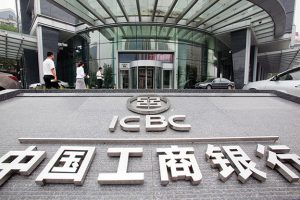Bloomberg
At least two of China’s largest state-owned banks are restricting financing for purchases of Russian commodities, underscoring the limits of Beijing’s pledge to maintain economic ties with one of its most important strategic partners in the face of sanctions by the US and its allies.
Industrial & Commercial Bank of China Ltd.’s offshore units stopped issuing US dollar-denominated letters of credit for purchases of physical Russian commodities ready for export, two people familiar with the matter said. Yuan-denominated letters of credit are still available for some clients, subject to approvals from senior executives, the people said, asking not to be identified discussing private information.
The move followed Russia’s invasion of Ukraine, which triggered a wave of sanctions from countries including the US, the UK and Japan and stoked speculation that more may follow. Because commodity-linked letters of credit are issued so frequently, they would be among the first transactions impacted by the threat of sanctions.
Bank of China Ltd. has also curbed financing for Russian commodities based on its own risk assessment, another person said. The lender has yet to receive explicit guidance on Russia from Chinese regulators, two people said.
The Chinese banks’ response could be temporary, especially given that Western sanctions have so far spared Russia’s energy sector. It’s unclear whether Chinese banks have pulled back from other forms of financing for Russian companies and individuals, and their policies could change.
The curbs highlight the difficult balancing act facing China’s biggest financial institutions and the nation’s president, Xi Jinping. While Russia is a major energy supplier to China and the countries often find themselves aligned in geopolitical disputes with the US, Russia’s economic weight pales in comparison to Western nations that buy many of China’s exports and control its access to the dollar-dominated international financial system.
China’s four largest banks have complied with previous US sanctions against Iran, North Korea and even top officials in Hong Kong because they need access to the US dollar clearing system, a person familiar with the matter said. In a phone call with Vladimir Putin on Friday, Xi urged the Russian leader to negotiate with Ukraine to defuse tensions.
“Chinese financial institutions take sanctions compliance seriously,†said Ben Kostrzewa, foreign legal consultant at Hogan Lovells in Hong Kong, who formerly handled US-China disputes and negotiations at the Office of the US. Trade Representative. “They don’t want to be sanctioned themselves, they can’t lose access to US dollar transactions, so they are going to have to think about it very seriously — whatever the geopolitical impact might be.â€
ICBC, Bank of China and the China Banking and Insurance Regulatory Commission didn’t immediately respond to requests for comment.
With international lenders including ING Groep NV and Rabobank also imposing restrictions on commodity-trade finance linked to Russia, demand for the nation’s resource exports could dwindle. Chinese state-owned coal importers are unable to get credit lines from banks in Singapore for shipments from Russia, people familiar with the matter said.
US sanctions put China’s state-owned financial institutions in a tough spot because many have established close ties with Russia over the past decade.
ICBC’s Moscow branch alone had close to $1 billion of assets by the end of 2020 and offered an extensive range of yuan-denominated services, including deposits, lending, cross-border settlement and trade finance.
 The Gulf Time Newspaper One of the finest business newspapers in the UAE brought to you by our professional writers and editors.
The Gulf Time Newspaper One of the finest business newspapers in the UAE brought to you by our professional writers and editors.
